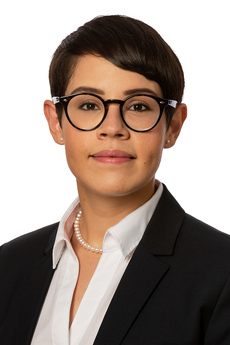
Dr.-Ing. Maria Gräfenhahn geb. Quevedo
- group:
Extrusion
- room: 404
- phone: +49 721 608 43608
- fax: +49 721 608 45967
- maria quevedo ∂does-not-exist.kit edu
Postanschrift: Kaiserstr. 12
Liefer- und Besucheranschrift: Gotthard-Franz-Straße 3
Geb. 50.31, 4. OG
D-76131 Karlsruhe
About me
Ever since I was a child, I have been interested in food and food stuff. I originally come from Ecuador and visited there a german school. Despite having my high school diploma from a german school, I still had to “re-do” one year at the Studienkolleg at KIT. After that, I decided to study chemical engineering in Karlsruhe, aiming to specialize in food process engineering. During my pre-diploma thesis, I dealt with the rheological characterization of low fat cocoa capillary suspensions. Thus, my interest in rheology and food processing technology grew. Then, I attended the LVT lectures at the institute and carried out my diploma thesis there. For that, I investigated the influence of thermomechanical stress on the structural and rheological properties of wheat proteins.
In August 2016, I started my doctoral studies as part of my work as a research scientist in the extrusion group at the LVT.
Research interests
Extrusion processing offer the possibility to create novel structures and textures such as, meat analogous products from plant proteins. The raw materials are treated at low water contents under high temperature and simultaneous shear treatment. My research focuses on the molecular change and the resulting functional properties through thermo-mechanical treatment. Due to the thermomechanical stress, proteins are structured, i.e proteins are denatured and new bonds are formed. Since the use of proteins requires a profound knowledge of the relationships between the protein structure and the functional properties, it is necessary to better understand changes of the molecular and functional properties of the proteins after thermomechanical treatment at a high protein concentration and how this can be used in a targeted manner.
Methods
The closed cavity rheometer “CCR" is used at our institute to produced defined extrusion-like conditions. Thus, proteins are subjected at low water contents, to thermal and mechanical treatment. With the CCR, the rheological properties of the proteins are measured during and after the treatment. The influence of the thermomechanical stress on the changes in the molecular structure and the resulting functional properties are investigated. The changes in the protein structure can be monitored by the denaturation degree measured by reverse chromatography and through changes in the protein-protein interactions by solubility analysis in various solvents. Molecular weight changes can be measured qualitatively and quantitatively by size exclusion chromatography. For the functional properties, the thickening and gelling behavior, as well as, the foaming and emulsifying properties are investigated.

